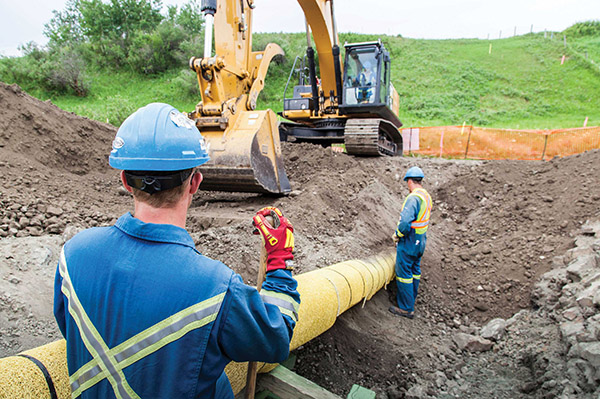Canada Regulators Face Activist Ire for Trans Mountain Variance Approval
(Reuters) — Environmental campaigners are criticizing Canada's energy regulator for approving a "variance" request on a section of the Trans Mountain Expansion pipeline project, calling new conditions around material procurement accompanying the approval too lenient.
Last week the Canada Energy Regulator (CER) agreed to Trans Mountain's request for a variance that will enable the Canadian-government-owned pipeline to use smaller diameter pipe on a 2.3-kilometer (1.4 mile) section in British Columbia, known as the Mountain 3 crossing, after encountering challenging drilling conditions due to hard rock.
The CER's approval clears the way for the long-delayed completion of the C$30.9 billion ($22.9 billion) expansion that will ship an extra 590,000 barrels-per-day of oil to Canada's Pacific Coast.
Environmental activists say the CER's conditions around the materials Trans Mountain can use to build the smaller section of pipe are too lenient. However, there is little they can do at this stage to block the approval.
Concerns about material quality was one of the CER's reasons for initially denying the variance in December, with the regulator warning that pipe or components that did not meet specifications could lead to them failing under pressure testing or operating conditions.
As part of its approval on Friday the CER waived a prior requirement that Trans Mountain follow a detailed Quality Management Plan (QMP) for procuring materials for the variance section of pipeline. The QMP is meant to be filed at least four months before any pipe components are manufactured, according to regulatory documents.
Instead, the regulator will allow Trans Mountain to file, two business days before it starts installing the new section of pipe, a letter signed by one of the corporation's officials confirming that the materials are up to standard.
"The evidence that Trans Mountain submitted (to the CER) was basically, 'Trust us'," said Sven Biggs, Canadian oil and gas program director at environmental advocacy group Stand.earth.
In an email, the CER said it had lifted the requirement on the variance section after assessing additional information provided in Trans Mountain's application.
"The Commission imposed conditions so that Trans Mountain ensures that pipe material quality is maintained," the regulator said.
Canadian heavy crude prices have been under pressure in recent months on concerns that further delays to the expansion could leave oil stranded in Alberta but have rallied since Friday's approval. Industry players cheered the CER's decision to loosen the condition on procuring materials.
"In our view, the relief that was granted avoids the potential for what could have been a lengthy delay in procuring materials for the Mountain 3 crossing to comply with the QMP," RBC Capital Markets analyst Greg Pardy said in a research note.
Friday's approval follows the CER granting a route change request from Trans Mountain in September on a different section of the pipeline near Kamloops, despite objections from the local First Nation.
Eugene Kung, a lawyer with West Coast Environmental Law, said the last-minute route change and variance request so late in Trans Mountain's construction process undermined faith in conditions placed on the project when it was approved in 2019.
"How much trust can we put in these so-called conditions when there's this repeated pattern of being granted relief from them?" Kung said. "Nobody wants to see a spill or pipeline failure, but it would be extra tragic and frustrating if that were to happen on that particular section."
($1 = 1.3497 Canadian dollars)
Related News
Related News

- Keystone Oil Pipeline Resumes Operations After Temporary Shutdown
- Freeport LNG Plant Runs Near Zero Consumption for Fifth Day
- Biden Administration Buys Oil for Emergency Reserve Above Target Price
- Mexico Seizes Air Liquide's Hydrogen Plant at Pemex Refinery
- Enbridge to Invest $500 Million in Pipeline Assets, Including Expansion of 850-Mile Gray Oak Pipeline





Comments